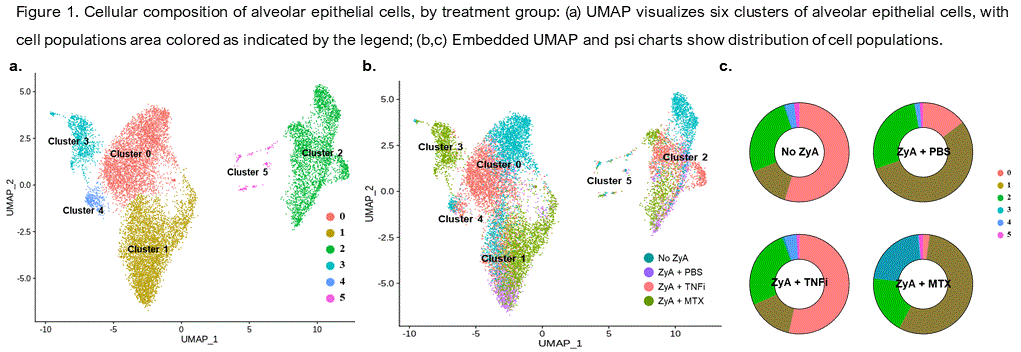Session Information
Date: Saturday, November 12, 2022
Title: RA – Animal Models Poster
Session Type: Poster Session A
Session Time: 1:00PM-3:00PM
Background/Purpose: Rheumatoid arthritis-associated interstitial lung disease (RA-ILD) is one of the pivotal extrapulmonary conditions. However, the pathophysiology of RA-ILD, including the effect of disease-modifying anti-rheumatoid drugs (DMARDs) is largely unknown. To study the effect of methotrexate and TNFα inhibitor on lung microenvironment of SKG mice using single-nucleus RNA sequencing.
Methods: Male SKG mice of eight to ten weeks received a single intraperitoneal zymosan A (ZyA) injection to induce arthritis and pneumonitis. We gave them twice-weekly intraperitoneal injections of PBS, methotrexate (7.5 mg/kg; MilliporeSigma), or TNFα inhibitor (100 μg/kg; R&D Systems, Inc., Minneapolis, MN, USA). Nuclei were prepared from frozen lung tissue under ribonuclease-free conditions by a method adapted from an existing protocol.
Results: Macroscopically, pneumonitis was most evident in SKG mice with ZyA and methotrexate treatment. A total of 59,860 nuclei were obtained from sixteen mice, four mice from each of the four groups. We classified each cell type using previous reports on the single-nucleus cells of mouse lungs. The most frequently observed cell was the type 2 alveolar (AT2) cell among all four groups. Alveolar epithelial cells were further subclustered into six clusters. Cluster 2 highly expressed type 1 alveolar (AT1) cell marker genes. Interestingly, a distinct cluster 3 was observed after methotrexate treatment. This distinctive alveolar epithelial cell cluster (cluster 3) showed IL-1, TNF, IFNα, and IFNγ perturbation-response signatures using Library of Integrated Network-Based Cellular Signatures (LINCS) 1000 ligand perturbation analysis. In addition, enrichment analysis revealed that cluster 3, as well as cluster 2 (i.e., AT1 cells) significantly enriched genes of BMI1 knockout mice that fail to self-renew their lung cells after damage.
Conclusion: The current study shows that methotrexate exacerbates lung inflammation via attenuation of the regenerative potential of AT2 cells.
To cite this abstract in AMA style:
Chang S, Choe J, Kim S, Kim J, Lee S, Lee J, Lee E. Effect of Disease-modifying Anti-rheumatic Drugs on Lung Microenvironment of SKG Mice [abstract]. Arthritis Rheumatol. 2022; 74 (suppl 9). https://acrabstracts.org/abstract/effect-of-disease-modifying-anti-rheumatic-drugs-on-lung-microenvironment-of-skg-mice/. Accessed .« Back to ACR Convergence 2022
ACR Meeting Abstracts - https://acrabstracts.org/abstract/effect-of-disease-modifying-anti-rheumatic-drugs-on-lung-microenvironment-of-skg-mice/

